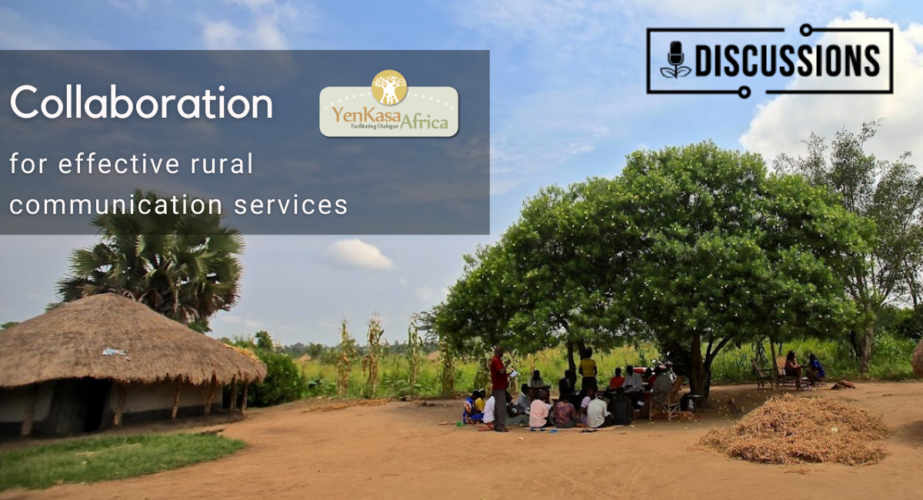During the month of July, Farm Radio International is facilitating an online discussion for YenKasa Africa, under the theme of Collaboration for Effective Rural Communication Services. This discussion brings together media – including Farm Radio’s radio partners – and civil society organizations. The discussion is taking place online, via WhatsApp, in a group for Anglophone participants and a group for francophone participants. This is a summary of the final week of the Anglophone discussion.
In the final week of our online discussion on Collaboration for Effective Rural Communication Services, we discussed whether all collaborations require funding. Here are the reflections shared by the discussion participants.
It is important not to confuse a mere relationship with collaboration. Not all relationships that broadcasters have with various stakeholders are collaborations. Many are just funding opportunities or promotional opportunities, as organization seek to promote their message or products, and radios exchange airtime for funds to keep the station running. Some are also just relationships to respond to broadcasters’ or listeners’ information needs, disappearing as soon as the goals are achieved.
In collaborations, partners have a shared goal and will always put something on the table to achieve that goal. It could be skills, finances, information, etc. And of course these have to be agreed upon from the onset. Sustainability becomes a problem when there is no set goal in that collaboration.
In the strict sense of the term “collaboration,” one should *not* expect the question of funding to arise: both partners may bring value in other ways. But, that also doesn’t mean that a collaboration won’t need financing to be successful – and perhaps both partners will need to collaborate to obtain funding from a third party.
When we start considering financing/funding, it means we are moving into a higher level of collaboration which we might accurately term “a partnership.” In a partnership, one stakeholder (NGO) might want the other (Radio Station) to dedicate a portion of their time, say 30 minutes every Wednesday at a specific time, to a specific thematic area. So, based on such demands/expectations of specifically agreed programming parameters, you enter into a “business”relationship that leads to a partnership agreement. Funding/sponsorship is involved and expected.
A lot of the discussion participants believe not all collaborations require money. Some are for the mutual benefit of the collaborators. Some are based on idea and knowledge sharing and this has nothing to do with funding. It also depends on the kind of collaboration you have, specific nature of the collaboration and the goals of the parties involved. While funding can be essential for certain projects or initiatives, and activities, collaboration itself does not necessarily require funding.
At the same time, a lot of the discussion participants believe collaboration needs funding as you will not be able to achieve the set goals without funds. All activities have a cost value. Most radio stations use volunteers and money is needed for general upkeep of the station. Even those who collaborate for free, it should not be free forever. The radio need equipment, production costs, transport, capacity building etc. Funding is just needed to make things work as expected.
COLLABORATION AND SUSTAINABILITY
Sustainability in collaborations between radio broadcasters and stakeholders is achieved through clear goals, mutual benefits, effective communication, and long-term commitment.
- For collaboration to be effective and sustainable, all stakeholders need to live up to their commitments.
- Effective collaboration requires funding for its sustainability. However, this should not be taken for it’s sole aim. The backbone of collaboration is funding, to be candid. It builds a lasting relationship among broadcast staffers ; presenters, announcers, producers, engineers, studio managers and others .It enhances mutual going-well
- What sustains collaboration between broadcasters and stakeholders is relationship and team spirit. We live in an environment where collaboration is needed, and where we need to support each other through effective communications and inter personal relationships.
- Funding is a motivating factor
- There are ways to sustain collaboration between stakeholders and broadcasters. The easiest one could be building mutual understanding between two parties and also going further to signing MoUs
- Building trust and reliability through collaborating with others may yield financial benefit in the long run
In conclusion, in as much as funds are needed and there is no sustainability without funds, we should not only look at what we are going to gain but rather put an effort that may result is us benefiting in the long run. An example is a broadcaster collaborating with a stakeholder without the involvement of funds, thereby producing programs that address the needs of the audience, that on its own will grow your audience and it may be easier for you get sponsorship for that program from a different stakeholder.
One participant had a few questions for stakeholders:
- Why is it that many stakeholders do not think about collaboration with the broadcasters at the designing stages of their interventions and projects?
- Why do they always expect the broadcasters to collaborate with them on pro-bono basis?.
These are relevant questions and a challenge to stakeholders to consider budgeting for media interventions than later deciding to use media to reach their goals.

